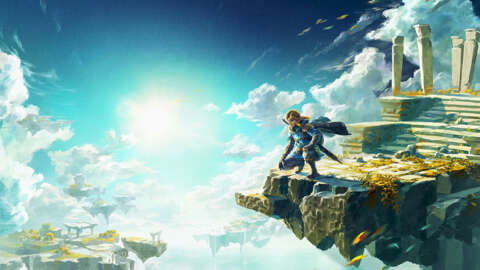The Legend of Zelda: Tears of the Kingdom is so much more than a sequel to Breath of the Wild. While this newest entry in the Zelda franchise is most recognizably similar to that 2017 game, it builds upon the foundation so thoroughly and transformationally that it feels like a revelation. This is The Legend of Zelda at its finest, borrowing the best pieces and qualities from across the franchise’s history and creating something new that is emotionally resonant, captivating, and endlessly rewarding.
Breath of the Wild upended the Zelda formula by presenting a vast and lush open world to explore–a reenvisioning of the unguided experience of the original Legend of Zelda for the Nintendo Entertainment System. Tears of the Kingdom follows in its predecessor’s footsteps with a similarly naturalistic setting, but the world has changed in subtle ways. Not everything is exactly the same or where you’d expect it to be, and the map is marked with myriad opportunities for exploration and curiosity. Once again, you’ll hardly ever round a corner or crest a hill without finding something else to do or engage with. Hyrule feels serene even as it bustles with life and activity. The score is as majestic as it is unintrusive, accentuating a dire battle or narrow escape with an exciting up-tempo rendition of the theme and then easing off with softer tones to let you breathe in the atmosphere.
Much of the reason that the world feels so different this time is that your tools for engaging with it are so much more flexible. Like the Great Plateau in Breath of the Wild, you don’t even enter the open world until you’ve found four key abilities in a tutorial area. Together, these abilities are the engine that drives Tears of the Kingdom–in the same way Breath of the Wild was centered on exploring wilderness using your slate of abilities, these new tools center Tears of the Kingdom around building and experimenting to overcome obstacles in inventive ways. It’s a beautifully implemented evolution of what made Breath of the Wild so special. While it’s more ambitious than Breath of the Wild in how much you can express your own creativity, it also manages to do this without buckling under its own weight.
